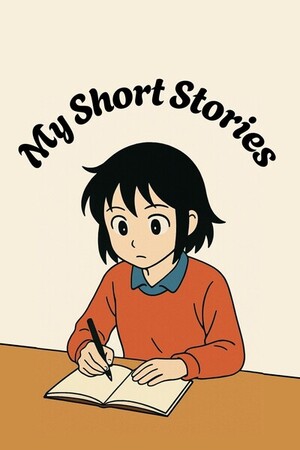Chapter 1:
AN UNNAMED CREATION EPIC
My Short Stories
"The possibility of ghosts haunting an abandoned hospital building, of a god protecting us from famine, or of a winged unicorn… Do human beings conjure these entities through imagination, or do such phenomena emerge in our minds because they already exist?
To create something beyond the reach of our five senses is wondrous, but what is even more marvelous is to believe in their existence. For belief is the refusal of other possibilities, and perhaps belief itself is the power that transforms abstractions into tangible beings."
Zeus burst into laughter. Half-reclined on a floor cushion, he stared at the television in front of him. While flipping through the channels, he muttered, “I love this man’s speeches!” He was addressing the Nameless One who had come to visit him.
The Nameless God, still gazing around the room, asked, “What do you think?” Zeus let out another hearty laugh.
“A god asking another god that question?” Then, turning to the Nameless One who sat politely on the couch beside him, he added in a more serious tone: “Humans believe that God created the universe. But perhaps it was they who created us, hm?”
The Nameless God touched his chin thoughtfully. The idea was compelling—supporting even his own existence.
Zeus switched off the TV and sat upright on his cushion. “There must be a reason for your visit…” he murmured.
With a smile, the Nameless One raised his head. “Finding you in such a home on earth is so surprising that I’ve forgotten why I came.”
Zeus yawned, unconcerned, and looked around the room. His gaze fixed on something. Following his eyes, the Nameless One noticed a woman’s skirt visible through the kitchen doorway. She was clearly cooking; warm aromas and the faint hum of a song drifted out.
Calmly Zeus remarked, “The heavens are crowded. Sometimes peace awaits in a home like this.”
Turning back, Zeus said, “Yes, I’m listening, young man! Though no one knows whence you came or which faith birthed you, it’s obvious that I am an ancient god compared to you. I see no harm in addressing you as such.”
“Well… yes,” replied the Nameless One. After a pause, he added, “I want to create worshippers of my own.”
Zeus replied, “It makes sense, since you don’t know the source of your being and have found no one in the universe to worship you.” He would have said more, but when the Nameless One interjected, “In another universe…” Zeus stopped short. “What?”
“All you had to do was build yourself a temple. Why go so far?”
“Well, can’t I?”
“If you’re asking permission, you don’t need it. I can’t speak for your capabilities. You’re nameless—unbound by any name, you may well have the power. Look at me. Thanks to tales and gossip, my reputation turned me into a rogue who snatched women. And my powers? They speak for themselves…”
Suppressing a laugh, the Nameless One remarked, “So mankind gossips about their gods as well.”
Zeus continued unfazed: “Choosing another corner of the cosmos, crafting a new planet with worshippers—that too is logical. But an entire system planned solely by you? Seems an unnecessary burden to me.”
The Nameless One murmured, “I only want worshippers more peaceful, more just. People who treat their world and each other with kindness.” He said it softly, aware that most religions were founded with such ideals yet failed.
Stretching out again, Zeus propped his head on his arm. “So long as you create humans, your desires will not be fulfilled. If you want to try something new, I suggest you ask others as well.” He waved a dismissive hand. “Now go.”
And so the Nameless God began seeking counsel from other deities.
***
“I suggest creating a world made entirely of females,” said Benten, her words cut short as she scooped from her bowl. “Feminine energy fosters peace.”
The Nameless One, seated on a stool beside her, pondered. It was winter. He had spotted Benten at a street-side food stall, wearing a green beanie and orange coat, looking more like a tired worker than a goddess.
Glancing at the old vendor, he wondered, “If only he knew he served a goddess…”
“How will they reproduce?” he asked.
“They’ll be hermaphrodites, of course,” Benten replied.
“And love?”
She smiled, pausing with her spoon in midair. “Love does not require the potential for reproduction.”
***
“And what does my son think?” Odin asked.
Sheepishly scratching his neck, the Nameless One admitted, “Thor threw me out.”
“Not surprised,” Odin chuckled. Sitting on a rock in a green meadow, he watched his flock of sheep. “He may have been jealous when you spoke of a new universe.”
After a long silence, Odin stroked his beard. “As for advice…” The Nameless God turned toward him. “I would not recommend creating primitive beings, as we once did.”
Confused, the Nameless One waited.
Odin continued: “Before humans, we created many prototype beings, so they might see the gods as the origin of all. Yet some believed not in their divine origin, but in their own evolution.”
***
“Did you ask Zeus too?” Hera inquired, sunbathing atop a lily pad in a green lake.
The Nameless One crouched by the water’s edge. Knowing of their enmity, he hesitated but told the truth: “He was the first I asked.”
Hera gazed silently at the sky. Then she said calmly: “I don’t think you need to overthink this. Just avoid siring children with every woman you find. Chaos grows as gods multiply. Divergent faiths have always sparked wars.”
The Nameless One wrote it down.
***
“Seeking advice from a god of chaos to build a world without war—that’s amusing. You should’ve gone to my brother,” said Set, seated proudly on his throne. With a flick of his hand he dismissed his servant waving a fan.
The Nameless One, standing before him, thought: “At last, a god who looks like a god.” Yet Set lived more like a king.
“I have no advice for you,” Set declared. But as the Nameless God departed, he added words worth noting:
“If you build a universe of peace, I won’t visit. Good has no meaning without evil. Light is nothing without darkness. Without chaos, peace is meaningless. Perhaps you must create war first—only then will your worshippers understand the value of peace.”
***
“May I speak with you?” asked the Nameless God. This time, he stood amid endless wheat fields. Rising above the stalks, he waited. He knew this goddess was shy.
When her voice finally came, he had nearly lost hope. Many gods, he’d learned on his journey, were dead—vanished when belief in them ceased. He had feared Pachamama was gone too.
“You are the wandering Nameless One?” she asked.
He nodded.
“I know what you seek,” she said.
“Do you have advice?” he asked, hearing only her disembodied voice echoing in the fields.
“Since I heard of your plan, I’ve been thinking. In a world without chaos, nature would not suffer so much. Yet such short-lived, numerous creatures as humans are cruel to the earth. Make them longer-lived, slower to reproduce.”
“That makes sense.”
“Nature heals all wounds if allowed, but not against such numbers.”
“Do you have a method for controlling population?”
“Increase the number of sexes, reproduction will decline.”
The Nameless God was startled—never had he thought of creating more than two genders. As he drew out his notebook, Pachamama added:
“Or make reproduction less desirable. Without lust, men and women would rarely unite. Other emotions are weaker than anger and desire.”
***
“I only wish for them to beautify the world they live in. Without wars, there will be peace,” explained the Nameless One to Buddha.
Sitting before a teahouse, Buddha quietly observed the passersby. The scent of mint tea mingled with the bustle of the market, stilling the Nameless One. “Why are all these gods mingling with mortals?” he wondered.
At last, Buddha looked at him with a gentle smile. “Sometimes you must fight even for peace. Not all wars are evil.”
The Nameless One lowered his gaze, hand on chin. After pondering, he murmured, “Then I must create peace first.”
Buddha responded, pressing a hand to his heart: “And what of the war within? What will you do with the war inside here?” Without waiting, he added:
“One who does not battle the self has no will. Can you call such programmed creatures your worshippers?”
***
The Nameless God created seven trial universes. In some he used different combinations. Yet none fulfilled his purpose. Some creations died out. Others lost their emotions.
At last, he blended fragments of all, producing a people much like humans. And in their stories too, it was said: the universe had been created seven times.




Please sign in to leave a comment.